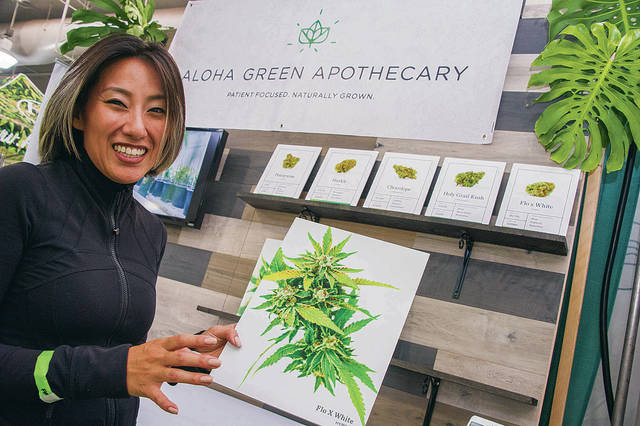The state Narcotics Enforcement Division is investigating allegations of illegal activity at last weekend’s Hawaii Cannabis Expo, where some vendors openly distributed cannabis seeds and other products.
Most of the more than 100 vendors, including all three of Oahu’s legal medical marijuana dispensaries, were not distributing products illegally. But some were straddling the line of recreational use — including a number of exhibitors “giving away” seeds by donation.
The state Department of Health notified the attorney general’s office and law enforcement about possible illegal sales at the event and is “concerned about the allegations,” DOH spokeswoman Janice Okubo said.
By law, pot can be sold only to registered medical cannabis cardholders and only at dispensaries licensed by the Department of Health.
“It was alarming to witness the brazen display and illicit sale of cannabis flowers, seeds and other cannabis products over the course of three days with minors in attendance,” said Teri Gorman, spokeswoman for the Hawaii Educational Association for Licensed Therapeutic Healthcare, or HEALTH, the trade association that represents the state’s eight licensed dispensaries, in an email to the Honolulu Star-Advertiser.
HEALTH had a booth at the expo to share information about medical cannabis and the state’s dispensary program.
“As state-licensed dispensaries, we are happy to comply with the letter of the law, but we also question why the same standard doesn’t apply to others,” Gorman said. “Our medical cannabis dispensary laws are designed to ensure licensees adhere to the nation’s highest standards of product, patient and public safety. For these standards to truly benefit Hawaii’s patients, the laws pertaining to illicit cultivation and sale of cannabis must be enforced.”
Organizers of the expo said they “regret to hear some of the Hawaii dispensary owners are disappointed in our event.”
“It has been our goal since 2015 to educate the public on the myriad of potential benefits offered by the cannabis plant and provide attendees with accurate information on how to safely access cannabis in Hawaii as a registered patient,” said Al Medeiros, one of the expo organizers, in a statement.
“We flew in subject matter experts from all over the world to provide educational seminars to teach our guests about CBD (cannabidiol) oil, cannabis and cancer, and home-growing techniques,” Medeiros said. “There are over 20,000 registered medical cannabis cardholders in the state and they are allowed to grow their own medicine at home. We had over 100 vendors this year, with some providing tools and information for home-growing purposes. We are satisfied with the security work plan that was implemented and complied with the rules and regulations of the venue, while delivering an event free of fights, thefts or major issues. As planning begins for future events, we will work with all industry stakeholders to ensure any issues are addressed.”
Helen Cho, spokeswoman for Aloha Green Apothecary, one of the legal dispensaries, said any illegal sale of cannabis “completely undermines the industry.”
“It’s the reason why the (dispensary) program exists: to not have untested, potentially unsafe products. This penalizes everyone who’s following the rules,” she said. “If this activity is actually going on, it makes the expo not legitimate. It’s actually preposterous if you think about it because it’s blatant black market activity. It gives our industry this very unfair disadvantage to grow. This cannabis industry in Hawaii has the potential to become such a strong economic pillar for the state, and the chances of that are dwindling when we got situations like this.”
Hawaii’s first dispensary opened in August, nearly two decades after the state approved the use of pakalolo for medical purposes. There are currently four dispensaries — Aloha Green Apothecary and Noa Botanicals on Oahu, and Maui Grown Therapies and Pono Life Maui on the Valley Isle. Cure Oahu is expected to open within weeks, while Green Aloha on Kauai is slated to start marijuana sales this month by appointment only. Two others, on Hawaii island, are projected to open by the summer, according to the Health Department. There were 20,279 medical marijuana cardholders as of Jan. 31.
Dispensaries grew 15,345 pounds of cannabis from Aug. 1 through Jan. 31. Of that, 367 pounds of lab-tested pakalolo were sold to patients, while 14,978 pounds were waste products such as stems, leaves and roots, according to the Health Department.
Dana Ciccone, CEO of Steep Hill Hawaii, Oahu’s only certified marijuana testing lab, was listed as a partner of the Hawaii Cannabis Expo on his Facebook page last week. He declined comment.
About 10,000 people attended the expo, the first one since medical marijuana dispensaries opened last year. Pot experts, advocates and doctors spoke at the expo about the benefits of the drug and helped residents become certified patients, while educating them on which strains are most beneficial for their conditions.
“This is a new industry for Hawaii and there are many and all types of people who are interested, and we do want to regulate it, and we want it professional, and we want it done properly and right,” said Sen. Will Espero (D, Ewa Beach) in an interview. “We put together the medical cannabis program to completely and ultimately eliminate or minimize the black market. (The dispensaries) are a new industry created by the state of Hawaii, and we want to see them succeed. It’s a legit concern.”

